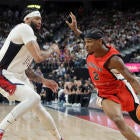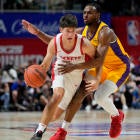We’ve all heard the classic “one play doesn’t win or lose a game” coach speak. There’s truth in that. A hundred things happen over the course of a game, and I get that, in theory, they’re all equal. The ones at the end count the same. I get all that. Technically.
But I’m also not ignoring the reality that a lot of games, certainly a lot of March Madness games, are largely decided on one play or one possession at the end of the game, as everything else has more or less evened out to that point. Such was the case in Gonzaga’s nail-biter Final Four matchup with South Carolina -- from which the Zags emerged victorious for a handful of reasons. First and foremost, they played really well. Better than South Carolina on the whole. Zach Collins and Nigel Williams-Goss were beasts.
The Zags deserved to win.
No question.
But they were also aided, unquestionably, by a rule that needs to change.
It’s not a rule you hear much griping about, but in spirit, it’s the absolute same thing as the infamous hack-a-Shaq rule that rewards teams for fouling a poor foul shooter -- which, of course, we hear plenty of griping about. And rightfully so. It’s a stupid part of basketball. As is the scenario that played out at the end of Gonzaga’s win on Saturday, when South Carolina, with just over 12 seconds to play, needed a 3-pointer to tie.
A 3-pointer they never got to take.
Why? Because Gonzaga fouled them, of course. Made Sindarius Thornwell go to the line with 3.5 seconds, and no timeouts, left. At that point we were no longer watching a basketball game. We were watching a math problem. He could either make both and the Gamecocks would still be down one, or make the first and miss the second, hoping for the shot-in-the-dark offensive rebound and putback.
Thornwell opted for the latter. It didn’t work. It almost never does. Which is why it’s always smart, no matter what anyone tries to tell you to the contrary, to foul when up three in the closing seconds. Within the confines of the rules, it’s simple: Why give a team a chance to tie the game with one shot when you can instead force them to make two shots with an offensive rebound in the middle?
People love to call this good strategy. It’s not strategy. It’s a loophole. It’s the basketball version of claiming bankruptcy when you’re still rich, benefiting from a rule that was, by definition, designed to punish. Free throws are supposed to be a reward in basketball. But in these scenarios, they’re a punishment. The fouler is rewarded for doing something against the rules. Which is stupid. And by the way, I’m stating the obvious. Everyone knows it. Everyone -- besides the team exploiting the rule -- wants to see potential game-tying shots in the waning seconds. That’s why we watch. That’s sports. Nobody pays for the extra cable package to watch teams shoot two free throws when they’re losing by three. This needs to be fixed.
The NBA has addressed the hack-a-Shaq problem, rewarding a team with free throws and possession of the ball for a foul away from the ball in the final two minutes. It’s not perfect. There are still ways to exploit it, and teams do exactly that every night. But they recognize the problem. And this is the same thing. When a team is down three, and the other team fouls intentionally to keep them from attempting a game-tying shot, there needs to be something more than two free throws as a result. And I think I might have the answer.
In the final two minutes of a game, if you foul away from the ball, it’s free throws and the ball. So that eliminates teams intentionally fouling away from the ball. Then, on top of that, any foul outside the three-point line is three free throws, whether it’s on a shot or not. That eliminates on-ball intentional fouls.
It’s not perfect. It would punish teams that foul accidentally, and would probably lead refs to swallow their whistles so as to not punish those “innocent” foulers. Who knows. Maybe there’s a a better way. Maybe you could give an option to the team that gets fouled, free throws or the ball out of bounds with consecutive fouls resulting in three free throws rather that two.
All of this might sound radical, but it’s really not. These are pretty small tweaks that probably just feel big either because we always tend to overreact to change, or because you don’t think this is that big a deal. To the latter I would say, plainly, yes it is. A lot of games, a lot of big games, come down to these final possessions. In the end, let teams like Gonzaga celebrate their defense in these situations, not their savvy exploitation of the rules.
Put another way, let teams like South Carolina regret the shot they missed.
Not the one they never got to take.

















